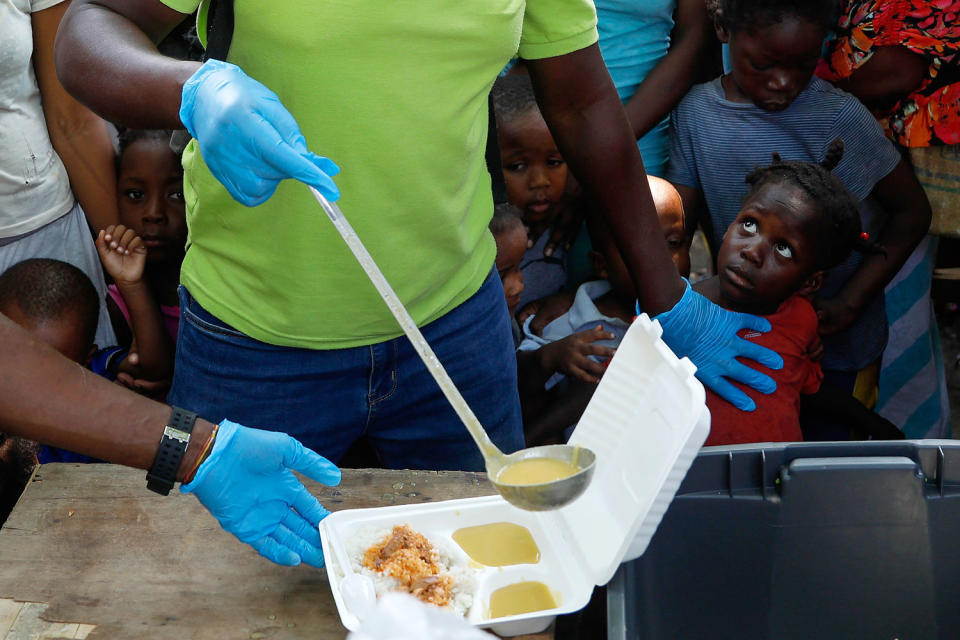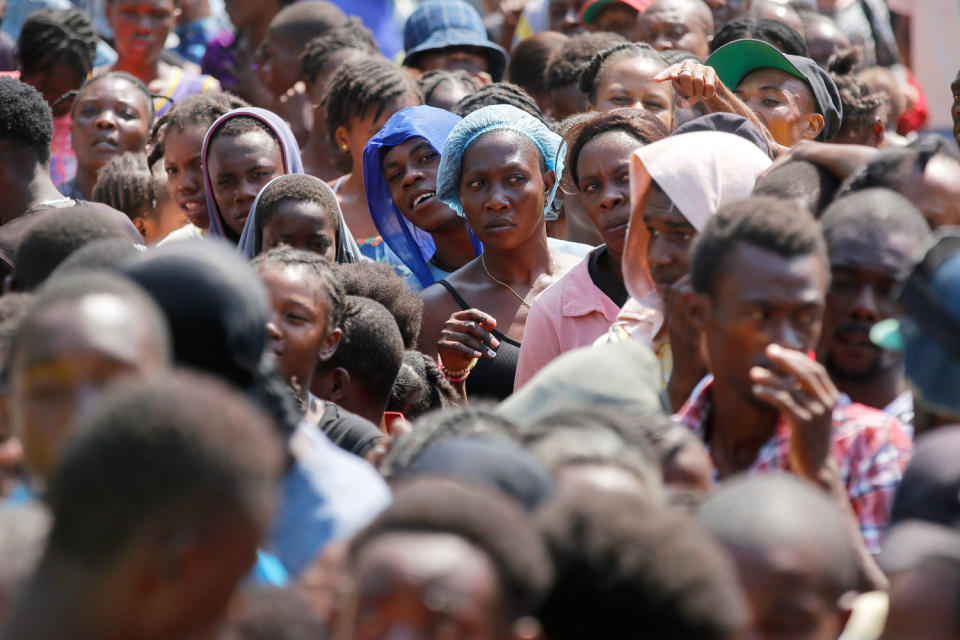Grassroots organizations in Haiti are the best channel to deliver aid, groups say
Monique Clesca lives in a suburban area in the mountains just above Port-au-Prince, away from the center of violence in the flatlands below. But Clesca said she fears the armed groups that control much of the capital city of Haiti will make good on their promise to go up into the hills and wreak havoc.
Clesca said she is largely confined to her home.
“A lot of stores have been closed. I went to the supermarket last Saturday, half an hour, just in and out. I rushed out,” she told NBC News. She said farmers and fishermen based in the rural areas outside the capital have not been able to bring their goods to Port-au-Prince for weeks. “There is a lot of poverty,” she said.
Haitian residents facing poverty and even starvation are desperate for food, shelter and medical supplies as political tensions grow and violence continues to escalate. Much aid is needed, but advocates and residents say the best humanitarian aid is one that supports the work of grassroots groups already established and helping civilians every day. Foreign aid, they say, usually falls into the hands of armed groups.
Haiti’s decadeslong political crisis and dire humanitarian emergency have come to a head since its de facto leader said he would resign. Amid the uncertainty, residents live in fear of armed groups who control everything, from where people can go safely to what resources they can access. But people have been trying to flee Port-au-Prince, the epicenter of the violence, for well over a year, and about 160,000 people have been displaced in the last several months, according to the U.N. Violent armed groups have occupied the Autorité Portuaire Nationale, the country’s largest port, obstructing access to most humanitarian aid.

In response, the European Commission has allocated 20 million euros to Haiti; the Biden administration has committed $33 million, and the United Nations announced on Thursday that it would establish an air bridge between Haiti and the Dominican Republic to make sure resources get into the country. The border between the two countries is closed now.
Greg Beckett, an associate professor of anthropology at Western University in Canada, told NBC News that while it seems foreign nations are allocating a lot of aid, that does not always mean it will reach the people who need it.
“There’s always these pledges of money, whether the money gets dispersed or not is one thing. It’s gonna go to the government, and you have a completely unconstitutional government in Haiti that’s not accountable and it’s not really clear how it’s spending any of that money,” Beckett, who has spent years intermittently working in Haiti, told NBC News.
When the gangs took over, they attacked the Autorité Portuaire Nationale and ransacked the shipping containers that were stored there, Beckett explained. “The food coming in can always be seized in some way,” he said.
Still, there are groups on the ground, many of them run by Haitians who are familiar with the complexities of the country, already operational. Fokal, Fonkoze and Partners in Health, an international nonprofit with several hospitals that employ almost all-Haitian teams, have worked consistently with those in and outside of Port-au-Prince amid the recent crisis.
Louino “Robi” Robillard, a Haitian community development activist, is the program director for Rasin Devlopman and co-founder of Gwoup Konbit, both of them organizations that advocate for resource-sharing, solidarity, and sustainable, Haitian-led development.
“We work with people in the countryside to empower them to use their local resources. Farm the land, plant more foods, look for resources that they have in their own communities,” Robillard said.
“People have to see development in a holistic way. We want people to not see Haitians as a group that are suffering with nothing to contribute. Haitians are very strong and we’ve been dealing with a lot but we’re still a very strong population. If we still can stand, it’s because people are together,” Robillard added.

Long existing groups like Doctors Without Borders and the World Food Program have embedded themselves in the country over the decades and are able to provide assistance through the chaos. Doctors Without Borders, or Médecins Sans Frontières, services the most impacted areas of Port-au-Prince and has continued its work despite attacks on their ambulances and armed break-ins at their medical centers. Meanwhile, as of March 12 the World Food Program has served 62,000 hot meals to 14,000 displaced people, according to a recent news release. Jean-Martin Bauer, the organization’s country director for Haiti, told The Kingston Whig-Standard that the group relies on a localized supply chain to make their operation sustainable.
“Because it is local farmers providing food to local schools, we don’t have any vulnerability in our supply chain linked to gang attacks on infrastructure,” he said.
Jake Johnston, researcher with the Center for Economic and Policy Research, a nonpartisan think tank, and author of “Aid State: Elite Panic, Disaster Capitalism, and the Battle to Control Haiti,” said that partnering with local groups and supporting local efforts will bolster long-term growth and reconstruction efforts even after money from foreign countries dries up.
“Haitians taking care of Haitians — that’s the primary mode of support that exists across the country. One way in which outside actors could support those actors is by sourcing things locally,” Johnston said.
“It’s not just about how you can get food into the capital, but how do you support farmers in rural areas to let them get food to the capital,” he added. He also said that humanitarian assistance should not be a “short-term solution that causes long-term problems.”
The crisis in Haiti is unfolding as the country continues to recover from the devastating earthquake in 2010 that killed about 220,000 people and another deadly earthquake in 2021. The country’s already fragile government, which was beset by brutal dictatorships for decades, took another hit with the assassination of democratically elected President Jovenel Moïse in 2021. Ariel Henry, with the acquiescence of the U.S. and several nations, became the unelected prime minister and leader of the country. His unpopularity only worsened as he delayed the presidential election to replace Moïse and armed groups already active in Port-au-Prince dialed up the violence in the last year.
Those groups, which include paramilitary and former police officers, are behind the escalation of murders, kidnappings and rapes since Moïse’s death, according to the Uppsala Conflict Data Program at Uppsala University in Sweden.
Haitians like Clesca and many others hold that Haitians should be in charge of their own solutions, rather than foreign leaders who have repeatedly ignored their voices and desires. In 2021, Clesca joined Haitian and non-Haitian religious leaders, women’s rights groups, lawyers, humanitarian workers and more to create the Commission to Search for a Haitian Solution to the Crisis. The commission has proposed a two-year interim government with oversight committees tasked with restoring order, eradicating corruption and establishing fair elections.
Clesca said Haitians must be the people in the driver’s seat. “There is an aspect of sovereignty that’s extremely important,” she said. “Yes, we need to work with different partners; yes, we will need help; but it is not them who will dictate what kind of help we should get and when we should get it.”
This article was originally published on NBCNews.com

